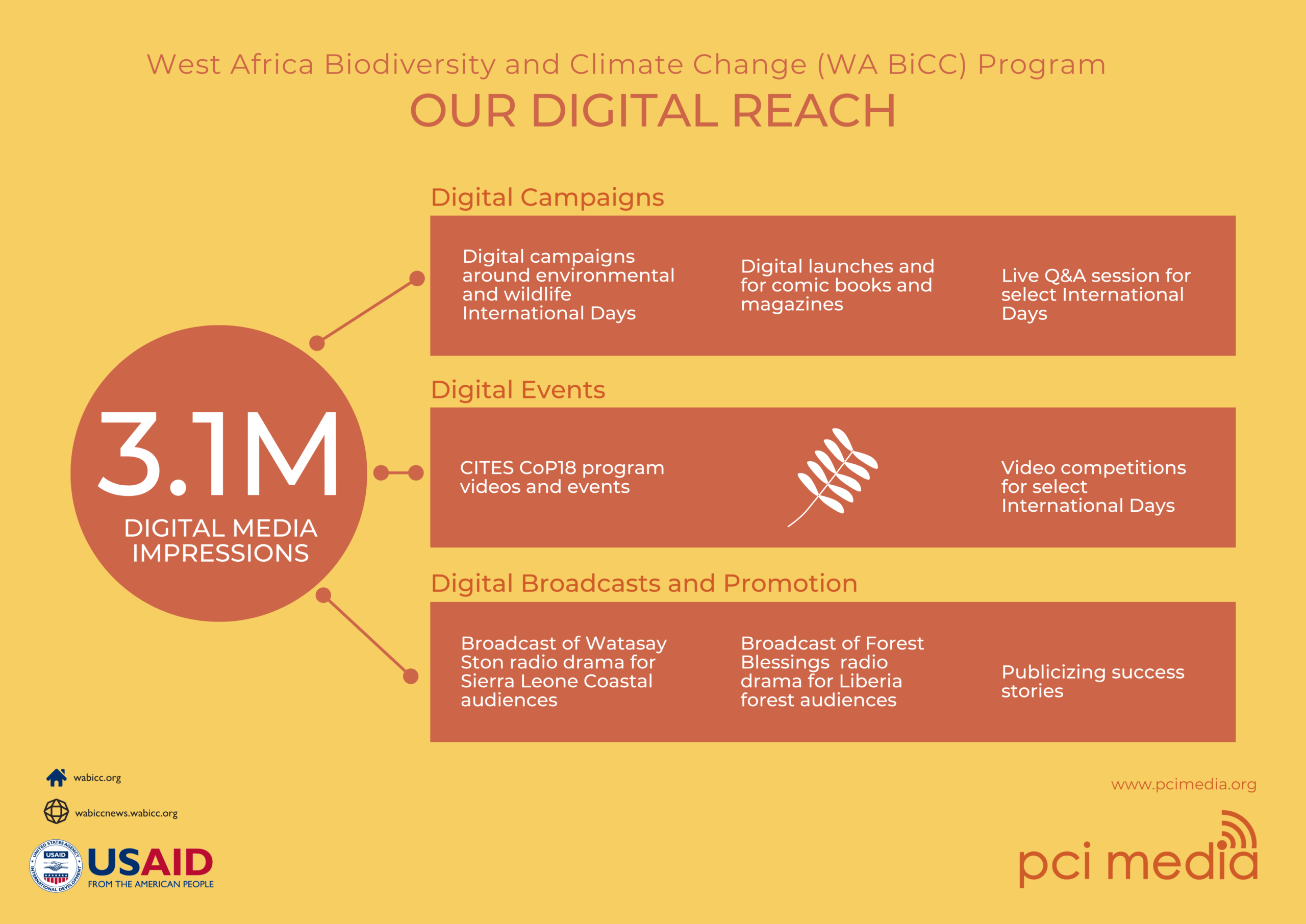Coast of Liberia
For five years, PCI Media led the comprehensive communications efforts for the West Africa Biodiversity and Climate Change Program (WA BiCC), funded by USAID and implemented by Tetra Teach ARD and its partners. West Africa faces many environmental challenges, including wildlife trafficking, low coastal resilience to climate change, and deforestation. Without significant changes in action from individuals, community members, and policy makers, climate change threatens the health, safety, and welfare of millions in the region.
Why Big Changes Need Strategic Communications
Producing powerful media across a variety of platforms to raise public awareness, shift social norms, and generate action has been a crucial component in driving change. As part of the strategy, we produced radio dramas, films, social media, comic books, community mobilization campaigns, and traditional advocacy to encourage audiences to take action and to promote sustainable behaviors. In order to do this effectively, our strategy engaged stakeholders at the individual, community, and policy level.
Our two radio dramas, Watasay Ston, broadcast in 24 coastal communities, 3 languages, 4 radio stations in Sierra Leone, and Forest Blessings, aired on 9 radio stations across Liberia, Sierra Leone, Guinea, and Côte d’Ivoire, increased people’s knowledge in forest conservation, alternative and sustainable livelihoods, related health issues, and the negative impacts of wildlife trafficking. Our monitoring and evaluation shows that over 45 thousand people participated in the campaigns that were promoted in these radio dramas. Callers repeatedly said communities need more awareness–raising activities, including radio programs like Forest Blessings in order to keep the conservation conversation going.
In addition to videos and radio programs, PCI Media launched a digital campaign on social media and managed the website. Our efforts resulted in a total of 3.1 million digital media impressions.

Community and Capacity Building
Community involvement and capacity building are at the forefront of our core values and methodology. Through training and workshops, we help ensure that our radio programs are a path to sustainable change. These workshops train local community members, including radio hosts, in how to facilitate call-in shows and dialogue that have the greatest impact on people.
- Communications and advocacy training for the Coastal Chiefdoms Natural Resource Management Network in Sierra Leone
- Training radio station presenters in facilitating meaningful discussions, Sierra Leone
- Communications and Advocacy Training for the Abidjan Convention and its partners
In creating content, participant input is essential to ensure engagement and relevancy. Community members were consulted in the design of radio dramas and media to ensure relevancy and accessibility.
Policy Level
Buy-in from individuals and local leaders is essential to implement changes in behaviors and practices. But policies are also needed to ensure clear guidance on which activities benefit the community and environment.
In 2015, PCI Media led Policy Dialogues in West Africa through our STEWARD program (Sustainable and Thriving Environments for West African Regional Development)—in partnership with US Forest Service and USAID—to create an important space for discussion and consensus among groups from different regions. These dialogues contributed to positive changes adopted by the Mano River Union (MRU), a group of four West African countries that share similar cultures, trans border forests, economic and security interests. Natural Resource Management is now a priority for MRU.
Providing strategic communications about issues of biodiversity conservation and climate adaptation, creates the space to help individuals, communities, and leaders shift attitudes and behavior, and create policy that preserves both the environment and also the millions of people who depend on the natural resources of the West Africa region. We look forward to the opportunity to continue our climate work in the region.


Recent Comments